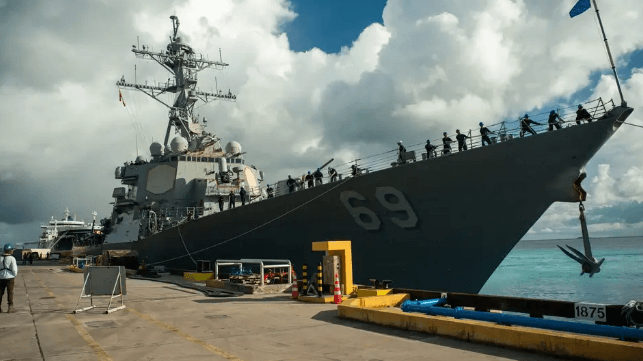UK Pauses Legislation to Transfer Chagos Islands to Mauritius

Britain's governing Labour Party has paused the progress of legislation to implement the recent diplomatic agreement to disband the British Indian Ocean Territory and transfer the sovereignty of the islands to Mauritius.
The agreement over the terms of the transfer, under which Britain will retain control of Diego Garcia and continue to host the US Naval Support Facility, was signed by Mauritius and the United Kingdom on May 25, 2025. But for the deal to come fully into force fully ratified, legislation must first pass through both Houses of Parliament.
The progress of the bill through the House of Lords has been interrupted by a court case and the potential defeat on an amendment to the legislation. Both hinge on the question of whether the inhabitants of the Chagos Islands were consulted before they were consigned to the sovereignty of Mauritius. A group of Chagos Islanders are vehemently opposed to being forced to become Mauritians, and would rather remain British. They complain they were not consulted before being transferred to Mauritius, and fear they are being treated in effect as slaves without human rights.
China, a close ally of Mauritius, has welcomed the deal. Dr. Huang Shifang, China's ambassador to Mauritius, has recently confirmed to the Chinese-friendly Prime Minister Navin Ramgoolam that Mauritius would soon be welcomed into Beijing’s Belt and Road initiative.
Critics of the deal focus on the mistreatment of the Chagos Islanders, but are also concerned that once a transfer of sovereignty is completed, there will be no recourse if Mauritius then breaks undertakings made in the UK-Mauritius agreement to keep Russia and China out of the Chagos archipelago. A precedent for such an outcome lies in the 1997 Hong Kong agreement: once sovereignty was transferred, the United Kingdom was unable to prevent China watering down promises made about respect for Hong Kong's autonomy. The United States appears willing to accept the risks that the operational security of the Diego Garcia Naval Support Facility could be compromised in a similar fashion.
It is unclear yet what the British government's intentions are regarding the legislation. Potentially, it could be abandoned, but there will first likely be an attempt to assuage the concerns of the Chagos islanders. Given that it appears likely that the Chinese may be permitted to build a new super-embassy in the heart of the City of London, worries that the Chinese may also in turn establish a presence in the Chagos islands fit into a pattern of British kowtowing to Chinese interests.
Two leading players behind the deal, UK National Security Adviser Jonathan Powell and Attorney General Lord Hermer, are under scrutiny in Parliament after the prosecution of two British nationals for spying for China was dropped before the case came to court, apparently in an attempt to avoid upsetting China. Former US Secretary of State Mike Pompeo recently described Powell as “strategically an absolute fool”, adding that “Mauritius is a close ally of the Chinese Communist Party and not only will we lose Diego Garcia, but you will have Chinese power projection from Diego Garcia.”
Opposition parties in the United Kingdom have promised to reverse the deal should they displace the current government. The risk is that not only could the United States lose the use of Diego Garcia, it may in turn become a base from which China can outflank India and project its influence into the Indian Ocean and Middle East.
Indian interests in the transfer agreement
According to reports carried in The Economic Times and the Times of India, India has secured agreement from the government of Mauritius allowing it to establish a satellite station in the Chagos archipelago, the purpose of which is to track satellites and ‘to serve as a strategic asset for monitoring the region’, a formula normally used to describe SIGINT collection sites. The report does not give a precise location for the new facility, which has probably not yet been fixed, but postulates it will be "near the Diego Garcia US-UK strategic base." It is not clear how the site will be serviced. The Indian ambition is likely to be to create a similar facility to that it has already established on Agaléga, an island belonging to Mauritius which - despite denials - India has already for practical purposes annexed.
Mauritius is heavily dependent on India’s support and goodwill, under which Mauritius operates as an offshore financial center for Indian interests. When the agreement was signed, India’s Prime Minister Modi said he had always supported decolonization of the Chagos, and that while "India and Mauritius are two nations, our dreams and destiny are one."

that matters most
Get the latest maritime news delivered to your inbox daily.
Also part of the Indian-Mauritius agreement, which was made during an eight-day visit of Mauritius PM Navinchandra Ramgoolam to New Delhi in September, was a plan to allow Indian naval vessels to conduct hydrographic surveys of the archipelago, most of which was a closed Marine Protected Area when administered by the British Indian Ocean Territory. Such surveys would be necessary if India’s Arihant Class nuclear-powered ballistic missile submarines are to operate in Chagos waters. Currently, INS Arihant (S2), INS Arighaat (S3) and INS Aridhaman (S4) are in service, and a fourth boat in the class was launched last year.
The deal also sees the refitting of a Mauritius Coast Guard ship to prepare it for patrol duties in the Chagos, and the provision of $680 million in aid, some of which is allocated to "development of the Chagos Marine Protected Area." A hallmark of the British-administered marine protection area was that it was not developed and was preserved in its pristine natural state.
The opinions expressed herein are the author's and not necessarily those of The Maritime Executive.
